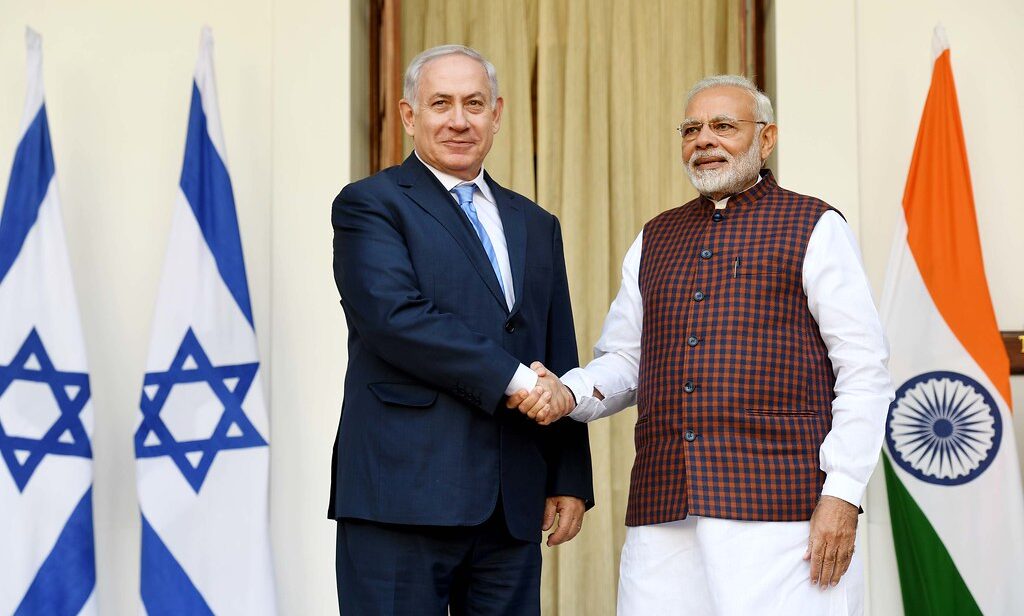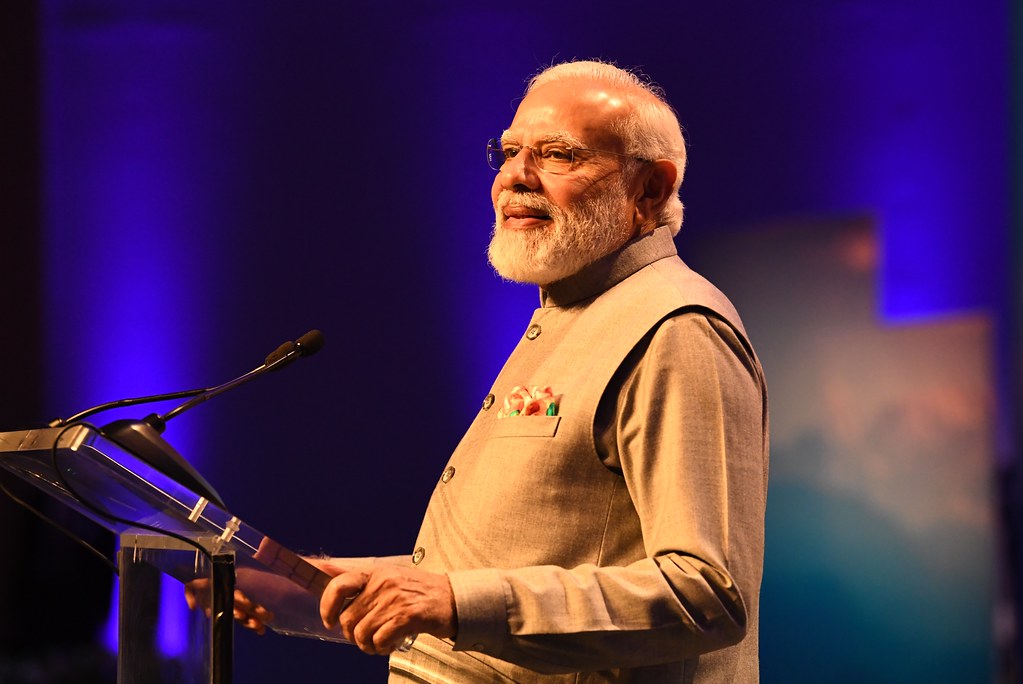
India, the world’s largest democracy, has emerged as an intriguing player in global politics. From Prime Minister Jawaharlal Nehru to Narendra Modi, decades of transformation from liberal democracy to right-wing Hindu nationalism highlight how India has changed over the decades. This gradual shift in ideology and ethos is reflected in New Delhi’s foreign policy – particularly in its changing relationship with Israel. Since its independence in 1947, India has followed a policy of non-alignment, championing the cause of Palestinians. Nonetheless, the current India-Israel relationship reflects a divergence from this history – India has expressed wholehearted support towards Israel since the October 7 attacks by Hamas and even abstained from the UN resolution calling for a humanitarian truce in Gaza.
The India-Israel Relationship
India’s support for Palestine primarily stemmed from their shared anti-colonial mindset and the shared experience of a nation being divided into two based on religion. India was a notable example of a nation that fought for centuries against British colonial rule, and India viewed Palestine as a nation that found itself in a similar circumstance. However, the partition of the subcontinent along religious lines created enduring tensions with neighboring countries. Pakistan’s state-sponsored terrorism, transnational crime, and the threat from China on the eastern front compelled India to reevaluate its foreign policy that, in a way, intersected with the interests of Israel in the Middle East. A primary driving force behind this unity was India and Israel’s stance against terrorism, which was accelerated in 2008 after a devastating terrorist attack in Mumbai that claimed hundreds of lives.
Not Just a Friend but also a Mentor
New Delhi hasn’t merely maintained its connection with Tel Aviv; it has positioned Israel as a mentor, endeavoring to glean insights on achieving religious nationalism, a model well practiced in Israel. In 2016, after India conducted surgical strikes in Pakistan-administered Kashmir in response to militant attacks that killed 19 Indian soldiers in Uri, Prime Minister Narendra Modi said that the action was encouraged by Israel. Even long before the event, during the 1999 Kargil War, Israeli surveillance drones, mortar shells, and technical advice played a crucial role in aiding India’s victory. Furthermore, India finds Israel’s methods particularly fascinating in defending against potential attacks from neighboring nations, given India’s own security concerns stemming from its nuclear neighbors.
A primary driving force behind this unity was India and Israel’s stance against terrorism, which was accelerated in 2008 after a devastating terrorist attack in Mumbai that claimed hundreds of lives.
India, like Israel, contends with domestic challenges of religious segregation. More than 200 million Muslims live in India, making it home to the largest number of Muslims in South Asia after Pakistan, and the third largest in the world. While there have been several instances of communal violence throughout the history of post-independent India, this violence has not been institutionalized. However, with the Bhartiya Janata Party coming to power in 2014 and imposing a Hindu nationalist agenda, discrimination against Muslims has reached an all-time high. Gregory Stanton, Founder and Director of Genocide Watch, describes “signs and processes” of genocide in the Indian state of Assam and Indian-administered Kashmir.
In 2019, the BJP government implemented the Citizenship Amendment Act (CAA), a constitutional reform widely perceived as targeting Muslims migrating from neighboring countries like Bangladesh and Pakistan. Supposedly, Israel extended its support for India by applauding the amendment, even in the face of international backlash.

Systematic oppression, targeted killings, and unequal justice for Muslims have turned out to be the norm in Modi-led India, much like they routinely take place in Israel. According to the nine monthly reports in 2022 by Human Rights Watch, there were 147 deaths in police custody, 1882 deaths in judicial custody, and 119 alleged extra-judicial killings against Muslims in India. Shocks heighten when security forces, after being accused of torture and killing, get impunity, as the Israeli Defense Forces persistently do after grave human rights abuses against Palestinians.
Cross-Continental Islamophobia
In the face of ongoing state-sanctioned injustices, a significant portion of the Indian media chooses to turn a blind eye to these occurrences owing to the lack of press freedom. Even Bollywood, India’s film industry, produces movies that perpetuate islamophobia by portraying Muslims as ‘terrorists’. Films such as ‘Kashmir Files’ and ‘The Kerala Story’ seem to serve the agenda of legitimizing the suppression of Muslims. The use of Indian cinema to propagate nationalist narratives mimics a common Israeli nationalist tool – Israeli-made movies such as ‘Fauda’ and ‘Innocence of Muslim’ have been criticized for their role in portraying Palestinian Muslims and their prophet Muhammad negatively.
India is now at a crucial stage, facing a pivotal choice: to reclaim its position as a diverse, tolerant, and democratic nation or to risk mirroring Israel’s path, frequently making international headlines for being an apartheid and big brother state.
Moreover, in the wake of the Israel-Hamas war, right-wing groups have spread misinformation about Muslims within both India and Israel. Al Jazeera reported that right-wing accounts, based in India, have spread a significant amount of disinformation on social media targeting Palestinians. Thousands of public WhatsApp accounts falsely spread graphic images and videos of the Syrian and Afghan wars, with captions such as ‘Muslim Evil’. Bharat Nayak, a fact-checker in the east Indian state of Jharkhand said, “They are using the crisis to spread misinformation against Muslims, saying they will attack Hindus in a similar way, and to falsely accuse opposition parties and others of supporting Hamas, and calling for their elimination.” This signals a convergence between the Islamophobic misinformation and propaganda strategies used by both Israel and India’s right-wing parties.
Conclusion
Even after the BBC unveiled an investigative documentary titled ‘India: The Modi Question,’ exposing evidence of Narendra Modi’s alleged involvement in the 2002 Gujarat Massacre of over 2,000 Muslims, Western nations have refrained from issuing strong criticisms of the BJP government. The United States even extended an invitation to PM Modi, after he was barred from entering the country for almost a decade for violating religious freedoms. This echoes a similar pattern in the U.S. treatment of Israel – ultimately, both India and Israel serve to safeguard U.S. interests against China and Iran respectively.
Yet, despite India’s uncanny resemblance to the Israeli state under the BJP, the glorious history of the country – marked by its struggles against colonialism and its steadfast commitment to democracy – is undeniable. With the potential to transform into a global powerhouse, India is now at a crucial stage, facing a pivotal choice: to reclaim its position as a diverse, tolerant, and democratic nation or to risk mirroring Israel’s path, frequently making international headlines for being an apartheid and big brother state.
Also Read: The Upward Trajectory of India-Israel Relations
***
Click here to read this article in Urdu.
Image 1: Prime Ministers Narendra Modi and Netanyahu via Flickr.
Image 2: Prime Minister Narendra Modi via Flickr.